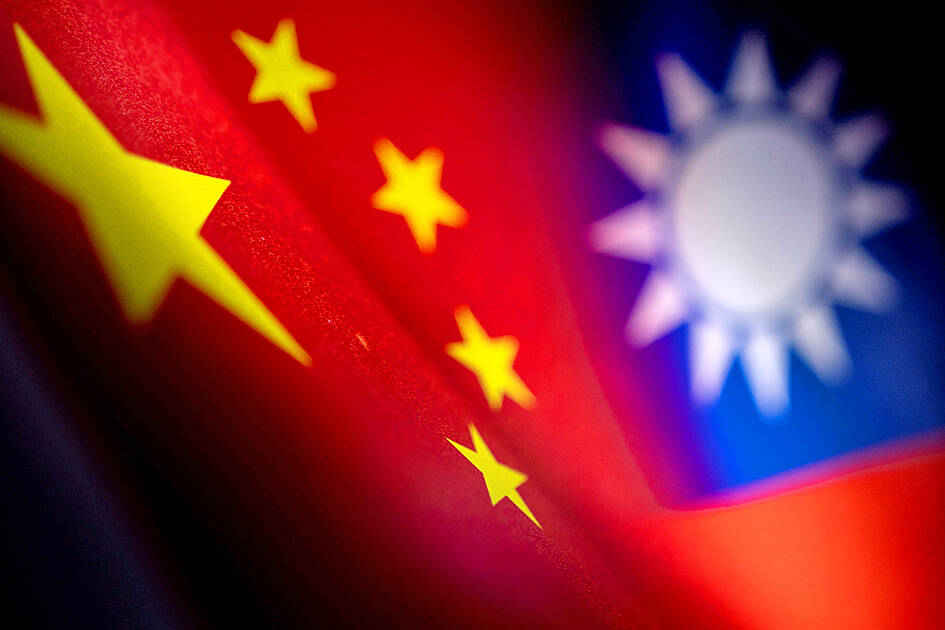Chinese Nationalist Party (KMT) caucus whip William Tseng (曾銘宗) yesterday said that Chinese state media had taken a phrase from the so-called “1992 consensus” out of context, after a state-run newspaper published an article on Saturday saying there could be no other interpretation of “China.”
The “1992 consensus” — a term that former Mainland Affairs Council chairman Su Chi (蘇起) in 2006 admitted making up in 2000 — refers to a tacit understanding between the KMT and the Chinese Communist Party (CCP) that both sides of the Taiwan Strait acknowledge that there is “one China,” with each side having its own interpretation of what “China” means.
The Ren Min Zheng Xie Bao, to mark the 30th anniversary of the Hong Kong talks — where the consensus was supposedly reached between representatives of Taiwan’s Straits Exchange Foundation and China’s Association for Relations Across the Taiwan Straits — on Saturday said that some senior members of the KMT in the past few years had sought to change the meaning of the term “1992 consensus.”

Photo: Reuters
The “1992 consensus” and “one China with different interpretations” both exist, Tseng said, adding that the KMT refused to accept singling out either part of the consensus, and neither would Taiwanese.
Democratic Progressive Party Legislator Wang Ting-yu (王定宇) said that Beijing’s stance was “a real slap in the KMT’s face.”
The KMT insists on the existence of the consensus, trying to deceive Taiwanese into thinking that the two sides of the Strait have their own interpretations of what “China” means, he said.
However, Beijing considers maintaining the “status quo” by using the names “Republic of China” or “Taiwan” as advocating for Taiwanese independence, he said.
For Beijing, there is only one China and one interpretation of it, he added.
Chinese media are bound by law to serve the CCP’s interests, and the article would have been reviewed by the Publicity Department of the CCP, he said.
China’s recent moves have made its ambition to annex Taiwan increasingly clear, while also showing that it does not care for the KMT, he said.
If KMT members “still have brains and a conscience,” they should accept that Taiwanese are facing China’s threats, he said.
“Only by protecting Taiwan can we resist China” and protect Taiwan’s democracy, freedom and economy, he added.

MAKING WAVES: China’s maritime militia could become a nontraditional threat in war, clogging up shipping lanes to prevent US or Japanese intervention, a report said About 1,900 Chinese ships flying flags of convenience and fishing vessels that participated in China’s military exercises around Taiwan last month and in January have been listed for monitoring, Coast Guard Administration (CGA) Deputy Director-General Hsieh Ching-chin (謝慶欽) said yesterday. Following amendments to the Commercial Port Act (商港法) and the Law of Ships (船舶法) last month, the CGA can designate possible berthing areas or deny ports of call for vessels suspected of loitering around areas where undersea cables can be accessed, Oceans Affairs Council Minister Kuan Bi-ling (管碧玲) said. The list of suspected ships, originally 300, had risen to about 1,900 as

Japan’s strategic alliance with the US would collapse if Tokyo were to turn away from a conflict in Taiwan, Japanese Prime Minister Sanae Takaichi said yesterday, but distanced herself from previous comments that suggested a possible military response in such an event. Takaichi expressed her latest views on a nationally broadcast TV program late on Monday, where an opposition party leader criticized her for igniting tensions with China with the earlier remarks. Ties between Japan and China have sunk to the worst level in years after Takaichi said in November that a hypothetical Chinese attack on Taiwan could bring about a Japanese

MORE RESPONSIBILITY: Draftees would be expected to fight alongside professional soldiers, likely requiring the transformation of some training brigades into combat units The armed forces are to start incorporating new conscripts into combined arms brigades this year to enhance combat readiness, the Executive Yuan’s latest policy report said. The new policy would affect Taiwanese men entering the military for their compulsory service, which was extended to one year under reforms by then-president Tsai Ing-wen (蔡英文) in 2022. The conscripts would be trained to operate machine guns, uncrewed aerial vehicles, anti-tank guided missile launchers and Stinger air defense systems, the report said, adding that the basic training would be lengthened to eight weeks. After basic training, conscripts would be sorted into infantry battalions that would take

DEEP-STRIKE CAPABILITY: The scenario simulated a PLA drill that turned into an assault on Taiwan’s critical infrastructure, with the launchers providing fire support Taiwan yesterday conducted this year’s first military exercises at Longsiang Base in Taichung, demonstrating the newly acquired High Mobility Artillery Rocket System’s (HIMARS) ability to provide fire support and deep-strike capabilities. The scenario simulated an attack on Penghu County, with HIMARS trucks immediately rolling into designated launch areas and firing barrages at the Wangan (望安) and Cimei (七美) islands, simulating the provision of fire support against invading forces. The HIMARS are supposed to “fire and leave,” which would significantly increase personnel and equipment survivability, a military official said. The drill simulated an exercise launched by the Chinese People’s Liberation Army (PLA) Eastern